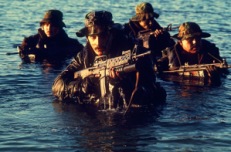 The world has been captivated this week as details emerge about the US raid to “kill or capture” Osama bin Laden. Of particular interest is the Navy SEAL team that silently slipped across the Pakistani Border, overcame unexpected challenges—including a downed helicopter, completed their mission, and all returned home safely.
The world has been captivated this week as details emerge about the US raid to “kill or capture” Osama bin Laden. Of particular interest is the Navy SEAL team that silently slipped across the Pakistani Border, overcame unexpected challenges—including a downed helicopter, completed their mission, and all returned home safely.
In addition to our gratitude, I think they’ve once again earned the moniker “elite” team.
I’ve been on a lot of teams in my life—everything from pick-up basketball teams to air combat teams. Not all of them have been what I’d call elite. When I look back at the best teams I’ve been on—whether in sports, Boy Scouts, military, business, even my marriage—I see five things they all share in common:
1. Deep Trust. The individuals in a team must trust one another. I’ve written about this here. The extent to which they trust each other is the extent to which they will contribute: 100% trust yields 100% effort. 50% trust yields 50% effort. It’s that simple.
2. High Standards. I’m talking about the quality of team members as much as performance. Demonstrating that you have high standards—not just saying you have high standards—not only breeds excellence in execution, but stokes healthy pride while differentiating your team from the rest of the pack.
3. Strong Commitment. Whether running a sports camp for refugees in the Gaza Strip or developing contingency war plans for potential hostilities on the Korean peninsula, the commitment of the individuals involved made all the difference on those teams. And here’s a secret: Commitment is contagious.
4. Worthwhile Purpose. Each of the teams that came to mind were struggling for something of significance. They were inspired and energized by the high stakes environment they were a part of. They knew they were making a difference.
5. Shared Suffering. Last but not least, whether it was designed or not, the elite teams I’ve been a part of have each endured hardship together. Sometimes it’s a disappointment or defeat. Other times it’s struggling with limited resources or with not being understood or appreciated. Whatever it is, it bonded us together even tighter.
Each of these qualities serves to forge a team identity—an identity that feeds, even as it is fed by, the individual members. From my experience, as you increase the intensity of any of these qualities you increase the quality of your team.
Which quality does your team need help with today? What’s missing from this list?
- Click to share on X (Opens in new window) X
- Click to share on Facebook (Opens in new window) Facebook
- Click to share on LinkedIn (Opens in new window) LinkedIn
- Click to share on Reddit (Opens in new window) Reddit
- Click to email a link to a friend (Opens in new window) Email
- Click to print (Opens in new window) Print